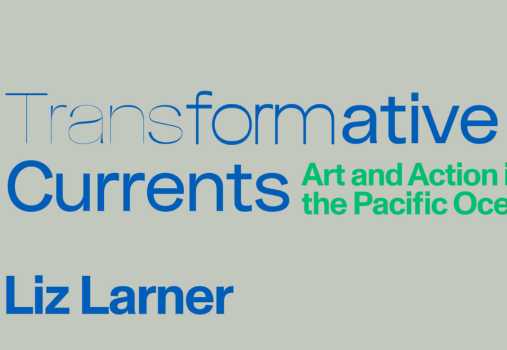
 2024-09-06
2025-01-05
America/Los_Angeles
Transformative Currents: Art and Action in the Pacific Ocean at OCMA
2024-09-06
2025-01-05
America/Los_Angeles
Transformative Currents: Art and Action in the Pacific Ocean at OCMA
Liz Larner (b. 1960, Sacramento, CA) creates sculptures that foster sensorial experiences and a reciprocal relationship between humans and objects, demonstrating an engaged and inquisitive perspective on the complexities of the world. Her recent sculptures, Meerschaum Drifts (2020–21) and Asteroids (2020–22), are two interconnected bodies of work. Made from plastic waste accumulated over three years, Meerschaum Drifts references the form of sea foam as a response to plastic pollution in the ocean. It also alludes to the Great Pacific Garbage Patch, a collection of marine debris in the North Pacific Ocean, drawing attention to plastic’s devastating environmental toll and its ominous future presence in marine environments as pervasive as seaweed or algae. Asteroids—ceramic pieces named after existing and imagined asteroids and inspired by the near miss of the “2019 OK” asteroid—symbolizes uncontrollable, potentially destructive natural forces. The ceramic works are presented in contrast to the human-generated crisis of plastic waste, hinting at the potential convergence of environmental disasters, cosmic movements, and earthly catastrophe. By juxtaposing her Meerschaum Drifts and Asteroids, Larner blurs the lines between celestial and oceanic spaces, urging contemplation on the state of the natural world.
Larner’s works are part of the multi-venue exhibition Transformative Currents: Art and Action in the Pacific Ocean, a group exhibition organized by the Oceanside Museum of Art, with additional presentations at OCMA and Crystal Cove Conservancy, which is part of PST ART: Art & Science Collide, 2024. Featuring twenty-one artists from the Pacific region, Transformative Currents examines the historical causes and ongoing effects of the cultural and environmental devastation of the Pacific Ocean and harnesses art’s potential to enact positive ecological change, both local and planetary. The exhibition is a continuation of a two-year Getty PST research grant that culminated in Sea Change, an international symposium hosted at OCMA in 2022.
Transformative Currents: Art and Action in the Pacific Ocean is curated by Cassandra Coblentz, independent curator, with support from Ziying Duan, OCMA’s Assistant Curator, and Aaron Katzeman, Postdoctoral Fellow, Getty Research Institute.
Southern California’s landmark arts event, PST ART, returns in September 2024, presenting more than 60 exhibitions from organizations across the region exploring the intersections of art and science, both past and present. PST ART is presented by Getty. For more information about PST ART: Art & Science Collide, please visit pst.art
Orange County Museum of ArtsEvent Description
Liz Larner (b. 1960, Sacramento, CA) creates sculptures that foster sensorial experiences and a reciprocal relationship between humans and objects, demonstrating an engaged and inquisitive perspective on the complexities of the world. Her recent sculptures, Meerschaum Drifts (2020–21) and Asteroids (2020–22), are two interconnected bodies of work. Made from plastic waste accumulated over three years, Meerschaum Drifts references the form of sea foam as a response to plastic pollution in the ocean. It also alludes to the Great Pacific Garbage Patch, a collection of marine debris in the North Pacific Ocean, drawing attention to plastic’s devastating environmental toll and its ominous future presence in marine environments as pervasive as seaweed or algae. Asteroids—ceramic pieces named after existing and imagined asteroids and inspired by the near miss of the “2019 OK” asteroid—symbolizes uncontrollable, potentially destructive natural forces. The ceramic works are presented in contrast to the human-generated crisis of plastic waste, hinting at the potential convergence of environmental disasters, cosmic movements, and earthly catastrophe. By juxtaposing her Meerschaum Drifts and Asteroids, Larner blurs the lines between celestial and oceanic spaces, urging contemplation on the state of the natural world.
Larner’s works are part of the multi-venue exhibition Transformative Currents: Art and Action in the Pacific Ocean, a group exhibition organized by the Oceanside Museum of Art, with additional presentations at OCMA and Crystal Cove Conservancy, which is part of PST ART: Art & Science Collide, 2024. Featuring twenty-one artists from the Pacific region, Transformative Currents examines the historical causes and ongoing effects of the cultural and environmental devastation of the Pacific Ocean and harnesses art’s potential to enact positive ecological change, both local and planetary. The exhibition is a continuation of a two-year Getty PST research grant that culminated in Sea Change, an international symposium hosted at OCMA in 2022.
Transformative Currents: Art and Action in the Pacific Ocean is curated by Cassandra Coblentz, independent curator, with support from Ziying Duan, OCMA’s Assistant Curator, and Aaron Katzeman, Postdoctoral Fellow, Getty Research Institute.
Southern California’s landmark arts event, PST ART, returns in September 2024, presenting more than 60 exhibitions from organizations across the region exploring the intersections of art and science, both past and present. PST ART is presented by Getty. For more information about PST ART: Art & Science Collide, please visit pst.art









